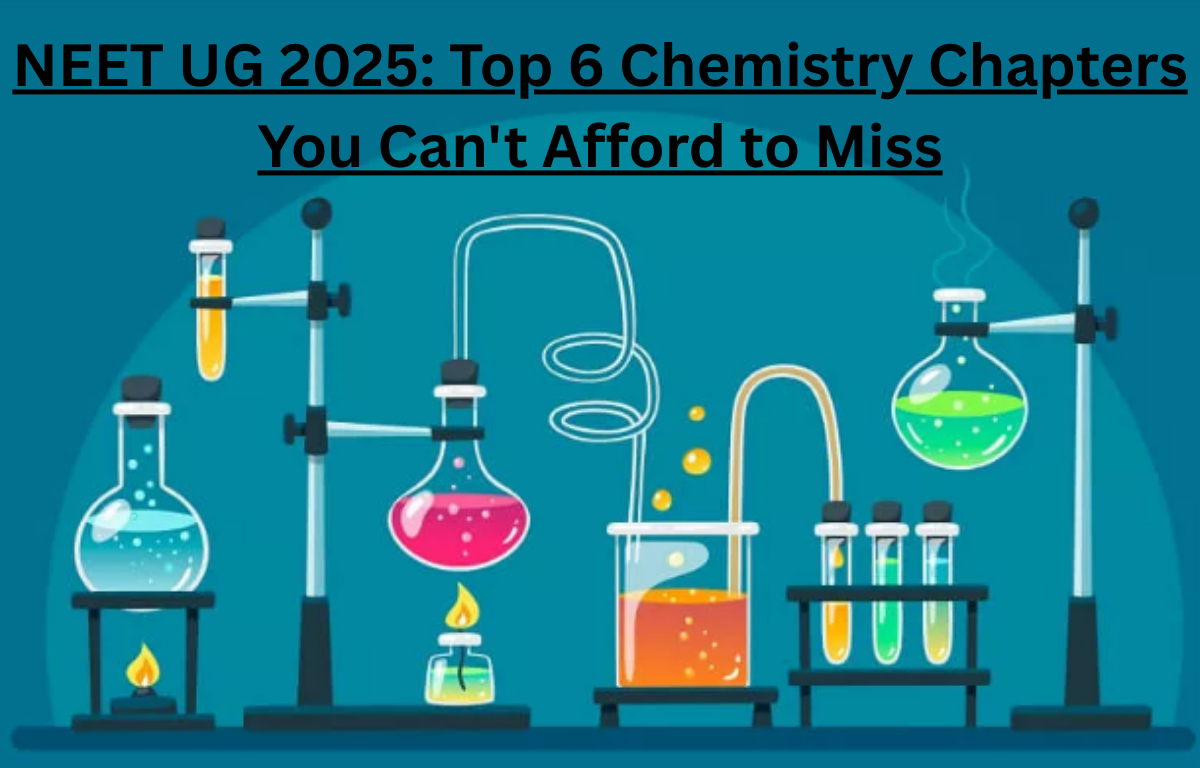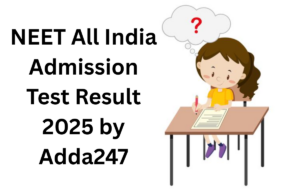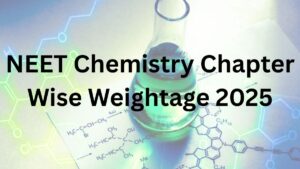Table of Contents
Are you studying for NEET UG 2025? Then don’t forget this! Here, we have mentioned the 6 most crucial chapters in Chemistry that will improve your score. The high-weightage topics should be known by the candidates to study for the NEET exam, as the majority of the questions will be based on these chapters.
The NTA updated the syllabus of NEET one year back — certain chapters were dropped, and some new relevant ones were incorporated. Don’t panic! We have thoroughly studied the new NEET syllabus and selected the most crucial topics for you. These chapters will enable you to concentrate better, save time, and confidently achieve high marks. Let’s get started!
NEET UG 2025 – Overview
According to the announced NEET Exam Date 2025, the NTA has decided to conduct the examination for all the ug students on May 4, 2025 [Sunday] between 2 PM and 5 PM at numerous examination centers all over India. The examination will be conducted in 13 languages: English, Hindi, Assamese, Bengali, Gujarati, Kannada, Malayalam, Marathi, Odia, Punjabi, Tamil, Telugu, and Urdu, so students from various places will find it convenient to sit for the examination.
NEET UG is conducted annually for those students who aspire to become physicians. It is the sole entrance test for MBBS, BDS, and other medical courses in prestigious colleges. It tests students’ knowledge in Physics, Chemistry, and Biology. Lakhs of students sit for NEET to fulfill their dream of becoming a doctor.
How to Begin the NEET UG Chemistry Preparation?
To start NEET UG Chemistry preparation, first know that the exam has the entire Class 11 and 12 Chemistry syllabus. Before studying key points, students need to have a clear idea about the syllabus and the NEET exam pattern. This enables them to plan wisely and know what type of questions will be asked. Knowing the fundamentals properly provides a good beginning! Divide the NEET Chemistry syllabus into small sections and begin with simple topics in order to gain confidence. NCERT books can be your best friends. After a strong foundation, move to the difficult chapters. Remain curious, remain regular — and Chemistry will be easy and enjoyable!
Top 6 Chapters in NEET 2025 for Chemistry
- Coordination Compound
- p-Block and d-Block Elements
- Periodic Table
- Hydrocarbons
- Alcohols, Phenols, and Ethers
- Carbonyl Compounds
Coordination Compound
Coordination compounds are chemical substances consisting of a central metal atom bonded to the ligand molecules or ions surrounding it. They play a significant role in biological processes and medicine. In NEET, this chapter carries a significant weightage and will have questions regarding naming, structure, and bonding in it. If you grasp coordination compounds properly, it can fetch you a higher mark in the NEET chemistry segment.
Important Topics
Below, we have discussed a few highly important topics from the Coordination Compound Chapter for both conceptual and numerical questions:
- Nomenclature
- Isomerism
- Ligands
- Coordination numbers
- Crystal Field Theory (CFT)
- Werner’s theory
p-Block and d-Block Elements
P-Block Elements:
P-block elements comprise groups 13 to 18 of the periodic table. They exhibit a large variety of properties and contain non-metals and metalloids, and certain metals. This chapter plays a crucial role in NEET with questions frequently asked regarding trends, ammonia and nitric acid-like compounds, and oxides. This requires intelligent revision and practice on a daily basis.
D-Block Elements:
D-block elements are also referred to as transition metals. They are coloured compounds and exhibit variable oxidation states. NEET tends to have questions related to electronic configuration, properties, and key compounds. This chapter is high scoring with good revision.
Important Topics
Carefully go through all these topics from the chapter: p-Block and d-Block elements, as they carry significant weightage in the NEET UG and JEE Main exams
- Focus on the properties of group 15-18 elements,
- Oxides, Halides,
- Transition elements and their oxidation states
Periodic Table
The periodic table is a table that organizes all the elements according to their atomic number, properties, and electronic configuration. In NEET, this chapter is extremely crucial as it lays the foundation for inorganic chemistry. Questions usually check trends and logic. A proper understanding of periodic trends can easily and accurately solve many NEET questions.
Important Topics
Candidates must carefully prepare the following topics from the chapter: periodic table, which are the core concepts in inorganic chemistry.
- Focus on key periodic trends like atomic radius
- Ionization energy
- Electronegativity
- Electron affinity
Hydrocarbons
Hydrocarbons are molecules composed only of carbon and hydrogen. They are primarily of three forms: alkanes, alkenes, and alkynes. This chapter is significant in NEET as it contains topics such as reactions, IUPAC nomenclature, and isomerism. Questions frequently arise from combustion, substitution, and addition reactions.
Important Topics
- Mechanisms of alkane, alkene and alkyne
- Wurtz
- Kolbe
- Markovnikov’s rule
- Ozonolysis
Alcohols, Phenols, and Ethers
This chapter involves compounds with –OH and –O– groups. Alcohols and phenols contain hydroxyl groups, whereas ethers contain an oxygen atom between two alkyl or aryl groups. In NEET, most questions are based on IUPAC naming, preparation, and reactions such as dehydration and oxidation. Phenol’s acidic nature is also significant.
Important Topics
Candidates must focus on:
- Reaction mechanisms like esterification
- Oxidation
- Electrophilic substitution in phenols
Carbonyl Compounds
Carbonyl compounds are aldehydes and ketones, which contain the –C=O group. They play a crucial role in NEET because of their structure, naming, and reactions such as nucleophilic addition, oxidation, and reduction. Tollens’ and Fehling’s tests are also requested. This chapter is scoring with expected questions. Mechanism understanding and reaction practice can make you answer NEET questions quickly. It’s one of the most crucial chapters in organic chemistry for NEET.
Important Topics
Candidates must focus on the following key areas:
- Reactions of aldehydes and ketones
- Cannizzaro
- Aldol condensation
- Nucleophilic addition
NEET UG 2025: Best Books for Chemistry Revision
When it comes to cracking NEET UG, Chemistry can be a real game-changer—if you’ve got the right books in hand! Whether you’re diving into concepts or brushing up before the exam, choosing the best resources can make all the difference. The perfect book doesn’t just teach; it simplifies, boosts confidence, and helps you tackle tricky questions with ease. From theory-rich texts to quick revision guides, having the right combination will supercharge your preparation and keep you ahead in the competition.
- NCERT Chemistry (Class 11 & 12)
- MTG NCERT at Your Fingertips – Chemistry
- GRB A Textbook of Physical Chemistry by Dr. O.P. Tandon
- Modern’s ABC of Chemistry
- Cengage Chemistry NEET Series
- 35 Years Chapterwise Chemistry NEET by Arihant
- Chemistry Quick Revision Notes by Career Point


 All India Scholarship cum Entrance Test ...
All India Scholarship cum Entrance Test ...
 NEET Chemistry Chapter Wise Weightage 20...
NEET Chemistry Chapter Wise Weightage 20...
 NEET UG 2025: Decoding the 720 Score For...
NEET UG 2025: Decoding the 720 Score For...


